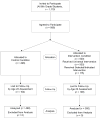Direct and indirect effects of a family-based intervention in early adolescence on parent-youth relationship quality, late adolescent health, and early adult obesity
- PMID: 23421838
- PMCID: PMC3634561
- DOI: 10.1037/a0031428
Direct and indirect effects of a family-based intervention in early adolescence on parent-youth relationship quality, late adolescent health, and early adult obesity
Abstract
We explored family processes in adolescence that may influence the likelihood of obesity in early adulthood using a randomized trial of a family-based intervention (the Family Check-Up, or FCU). The FCU has been shown to reduce escalations in antisocial behavior and depression in adolescence by supporting positive family management practices, but no research has examined the mechanisms by which the FCU could influence health-related attitudes and behaviors linked to obesity. Participants were 998 adolescents (n = 526 male; n = 423 European American; M age 12.21 years) and their families, recruited in 6th grade from 3 middle schools in the Pacific Northwest. We used structural equation modeling (SEM) and an Intent-To-Treat (ITT) design to evaluate the direct and indirect effects of the FCU on parent-youth relationship quality (ages 12-15), healthy lifestyle behaviors, eating attitudes, depressive symptoms (all measured at age 17), and obesity (age 22). We found that the FCU led to greater parent-youth relationship quality, which predicted enhanced health-related behaviors, reduced maladaptive eating attitudes, and reduced depression. In turn, reduced maladaptive eating attitudes predicted reduced odds of obesity. The indirect effect of the FCU on obesity by way of parent-youth relationship quality and eating attitudes was significant. Our findings illustrate how family processes may influence adolescent health and suggest that family functioning may be an additional factor to consider when developing intervention programs for obesity.
PsycINFO Database Record (c) 2013 APA, all rights reserved.
Figures


References
-
- Allen JP, Land D. Attachment in adolescence. In: Cassidy J, Shaver PR, editors. Handbook of attachment: Theory, research, and clinical applications. New York: Guilford; 1999. pp. 319–335.
Publication types
MeSH terms
Grants and funding
LinkOut - more resources
Full Text Sources
Other Literature Sources
Medical

